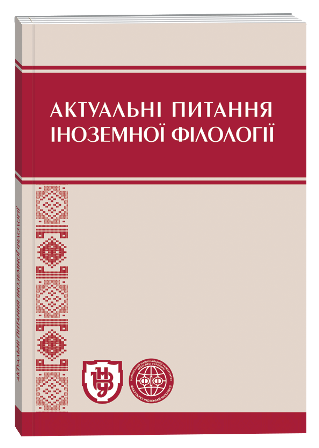EXPLICATION THE CATEGORY OF THE NEGATIVE EVALUATION BY MEANS OF THE VERBS OF REPRESENTATION IN DISCOURSE
Keywords:
lexico-semantic field, nucleus, periphery, category, negative evaluation, verbs of representation, verbs of substitutionAbstract
This article is devoted to the analysis of the peculiarities of the realization the category of evaluation in discourse by means of the verbs of representation with the seme of the negative evaluation. The category of evaluation as the linguo-stylistic conception is defined as appraisal meaning within semantic structure of the word which realizes the attitude of the language collective to the words correlation with the word conception or object (good/approve). The category of evaluation is closely connected with the denotative and connotative meanings. The word in the plan of content can be distinguished as positive and negative and in plan of expression as implicit or explicit. In the context the word can attain an evaluative component of bad quality and this component can be realized implicitly or explicitly depending on the author’s outlook. The category of evaluation is characterized as the structure of the lexico-semantic field. The article is devoted to the peculiarities of the realization of the category of evaluation in the discourse by means of the verbs of representation with the seme of the negative evaluation. These verbs are divided into three groups: (a) the verbs which possess a distinctive seme “evaluation”. The verb “to hate” which is the particularly productive is regarded as a nucleus of the lexico-semantic field of the category of evaluation with the negative meaning. The verbs to dislike, to disgust, to blame, to annoy to irritate are included to the periphery of this field. (b) the verbs which express an evaluation contextually. Among the verbs of evaluation besides those that belong to the lexico-semantic field to hate it is possible to distinguish some verbs which within the certain context can express the negative evaluation. These verbs are: to doubt, to hesitate, to fail, to kill, to trouble, to envy. (c) the verbs of substitution to do, to be The verb to do is often qualified not only as the auxiliary verb, but also as the representative. According to our research the verb to do in the negative form can realize it evaluation meaning, that is transfer from the positive to negative field and v.v. The verb to be is considered as a verb of representation and also as a link verb. The verbs of substitution can be considered as the auxiliary and representative. In both of these functions they explicate the category of evaluation.
References
Авганова Н. А. Синтаксические конструкции оценочной семантики : автореф. дис. … канд. филол. наук : 10.02.04 «Германские языки»/ Н. А. Авганова. – М., 1975. – 18 с.
Азнаурова Э. С. Очерки по стилистике слова / Э. С. Азнаурова. – Ташкент : ФАН Узб.ССР, 1973. – 401 с.
Арнольд И. В. Стилистика современного английского языка (стилистика декодировния) / И. В. Арнольд. – М. : Просвещение, 1969. – 279 с.
Барлас Л. Г. Об отношении стилистической окраски и эмоциональных оттенков слова к его лексическому значению / Л. Г. Барлас // Вопросы лексики и фразеологии современного русского языка. – Ростов-на-Дону, 1968. – С. 146–153.
Брандес М. П. Стилистический анализ / М. П. Брандес. – М. : Высш.шк., 1971. – 1277 с.
Буссел Ф. Ф. Глаголы-заместители в современном английском языке / Ф. Ф. Буссел // Іноземна філологія. – Львів, 1965. – № 3. – С. 42–47.
Васильев Л. М. Современная лингвистическая семантика / Л. М. Васильев. – М. : Высш.шк., 1990. – 175 с.
Вольф Е. М. Функциональная семантика оценки / Е. М. Вольф. – М. : Наука, 1985. – 226 с.
Воронина Л. А. Глагол-заместитель to do в современном английском языке : дис. канд. филол. наук : 10.02.04 / Л.А. Воронина. – Харьков, 1953. – 192 с.
Гришкун Ф. С. Репрезентация глагола в современном английском языке : автореф. дис. … канд. филол. наук : 10.02.04 «Германские языки» / Ф. С. Гршкун. – Л., 1978. – 18 с.
Зубов А. В. О языковых средствах выражения категории оценки в современном английском языке (на материале англо-американской прессы) : дис. … канд. филол. наук : 10.02.04 / А. В. Зубов. – М., 1975. – 174 с.
Кузнецова В. А. Категория отрицательной оценки и ее отражение в системе глаголов современного английского языка : дис. …канд. филол. наук : 10.02.04 / В. А. Кузнецова. – Л., 1982. – 153 с.
Петрищева Е. Ф. Изменения в составе интеллектуальной оценной лексики в русском языке советского времени / Е. Ф. Петрищева // Развитие лексики в современного русского языка. – М. : Наука, 1965. – С. 51–74.
Стенбергер И. В. Лексическая семантика английского глагола / И. В. Стенбергер // учебн. Пособ. к спецкурсу. – М. : Изд-во Моск. гос. ун-та, 1984. – 120 с.
Англо-русский синонимический словарь/ [сост. А. И. Розенман, Ю. Д. Апресян]. – М. : Рус. язык, 1988. – 542 с.
Словарь лингвистических терминов / [сост. О.С. Ахманова]. – М. : Сов. энциклопедия, 1966. – 606 с.
Oxford Paperbook Thesaurus. – Oxford : Gr. B., 1973. – 909 p.
The Oxford English Reference Dictionary. – Oxford, 1996. – 1761 p.
The New American Roget’s College Thesaurus. – New York, 1978. – 572 p
The New Shorter Oxford English Dictionary / The New Authority on the English Language. – Oxford, 1993. – vol. II. – 3801 p
Webster’s Desk Dictionary of the English Language. – New York : Portland House, 1990.
Collier Cristopher. James Lincoln Collier. Decision in Philadelphia. – New York : Random House, 1986. – 271 p.
Hailey Arthur. Overload. – New York, 1986. – 500 p.
Shaw Irving. Evening in Byzantium. Great Britain, 1976. – 284 p.
Downloads
Published
How to Cite
Issue
Section
License
Copyright (c) 2025 Олександра Островська, Людмила Поплавська

This work is licensed under a Creative Commons Attribution 4.0 International License.







